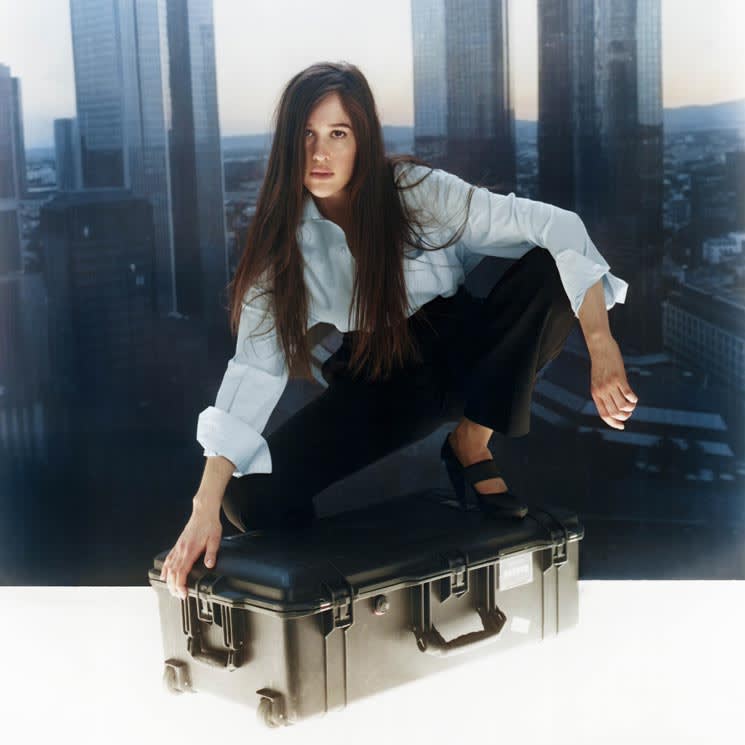After taking time to regroup after a year of touring, ironically prompted by 2016's Adieux Au Dancefloor, Montreal synth/spoken word artist Marie Davidson has emerged with an album that defies the entire lifestyle that breakthrough dropped on her.
While Adieux Au Dancefloor took inspiration from duelling fascination and disgust with nightlife, Working Class Woman widens the lens to connect the dots between when the party ends and when the next one begins, with a series of vignettes that problematize the grind, shedding light on the restless comedowns and the relentless tedium of it all.
Kicking off with blankly read interpretations of all the punishing post-set interactions you can imagine on "Your Biggest Fan," with a clever gesture of juxtaposition, Davidson moves from the chore of interfacing with poseurs to "Work It," a track immediately reminiscent of Adieux Au Dancefloor opener "Dedicate My Life," articulating her occupational commitment this time through the over-flexed rhythm of an instructional exercise video set to a lunging house track.
Later, synth arpeggios rush to work overtime after a bleating alarm clock breaks a power nap dreamscape on "Lara." "The Psychologist" sweats it out to therapy, and on "Workaholic Paranoid Bitch" an urgent drum line contorts and evolves with every bar, progressively busier and more complex, losing itself briefly down an abstract rabbit hole before picking itself up and hurling headlong into the night.
Populating a club sound with slices of nine-to-five careerism, Davidson equates nightlife with the very culture it is often suggested to offer an escape from, and de-romanticizes the myth of the touring artist.
While Adieux Au Dancefloor used dance music as a vehicle for the criticisms Davidson reserved for the world that worshipped it, Working Class Woman often takes more abstract turns to emphasize how greatly the glamour has been exaggerated.
On "Day Dreaming" Davidson delivers a road code ("A booker will book you / A promoter will pay you / A player will play you") over a Lynchian haze of softened keys and chimes. "The Tunnel" is a stress-carved, jagged noise piece that has Davidson reckoning with a glass ceiling sunk so low she's crawling through the broken shards, and "La chambre intérieure" caps it off with a track more suited for the chill out room, all starry modular blips that rush out into the distance while Davidson serves up wistful monologues about the children playing in the field next to her dad's house.
That Davidson pivots to these more abstract forms of composition to convey the material may, on first listen, seem like a forfeit to content, but that she is willing to challenge her audiences (especially the new ones) in spite of the club's stamp of approval might be even more transgressive than smuggling her critiques into tracks sculpted for the dance floor.
All filtered through Davidson's signature brand of deadpan humour, this is a hilarious, challenging dance floor record, and you're going to have to take it seriously.
(Ninja Tune)While Adieux Au Dancefloor took inspiration from duelling fascination and disgust with nightlife, Working Class Woman widens the lens to connect the dots between when the party ends and when the next one begins, with a series of vignettes that problematize the grind, shedding light on the restless comedowns and the relentless tedium of it all.
Kicking off with blankly read interpretations of all the punishing post-set interactions you can imagine on "Your Biggest Fan," with a clever gesture of juxtaposition, Davidson moves from the chore of interfacing with poseurs to "Work It," a track immediately reminiscent of Adieux Au Dancefloor opener "Dedicate My Life," articulating her occupational commitment this time through the over-flexed rhythm of an instructional exercise video set to a lunging house track.
Later, synth arpeggios rush to work overtime after a bleating alarm clock breaks a power nap dreamscape on "Lara." "The Psychologist" sweats it out to therapy, and on "Workaholic Paranoid Bitch" an urgent drum line contorts and evolves with every bar, progressively busier and more complex, losing itself briefly down an abstract rabbit hole before picking itself up and hurling headlong into the night.
Populating a club sound with slices of nine-to-five careerism, Davidson equates nightlife with the very culture it is often suggested to offer an escape from, and de-romanticizes the myth of the touring artist.
While Adieux Au Dancefloor used dance music as a vehicle for the criticisms Davidson reserved for the world that worshipped it, Working Class Woman often takes more abstract turns to emphasize how greatly the glamour has been exaggerated.
On "Day Dreaming" Davidson delivers a road code ("A booker will book you / A promoter will pay you / A player will play you") over a Lynchian haze of softened keys and chimes. "The Tunnel" is a stress-carved, jagged noise piece that has Davidson reckoning with a glass ceiling sunk so low she's crawling through the broken shards, and "La chambre intérieure" caps it off with a track more suited for the chill out room, all starry modular blips that rush out into the distance while Davidson serves up wistful monologues about the children playing in the field next to her dad's house.
That Davidson pivots to these more abstract forms of composition to convey the material may, on first listen, seem like a forfeit to content, but that she is willing to challenge her audiences (especially the new ones) in spite of the club's stamp of approval might be even more transgressive than smuggling her critiques into tracks sculpted for the dance floor.
All filtered through Davidson's signature brand of deadpan humour, this is a hilarious, challenging dance floor record, and you're going to have to take it seriously.




